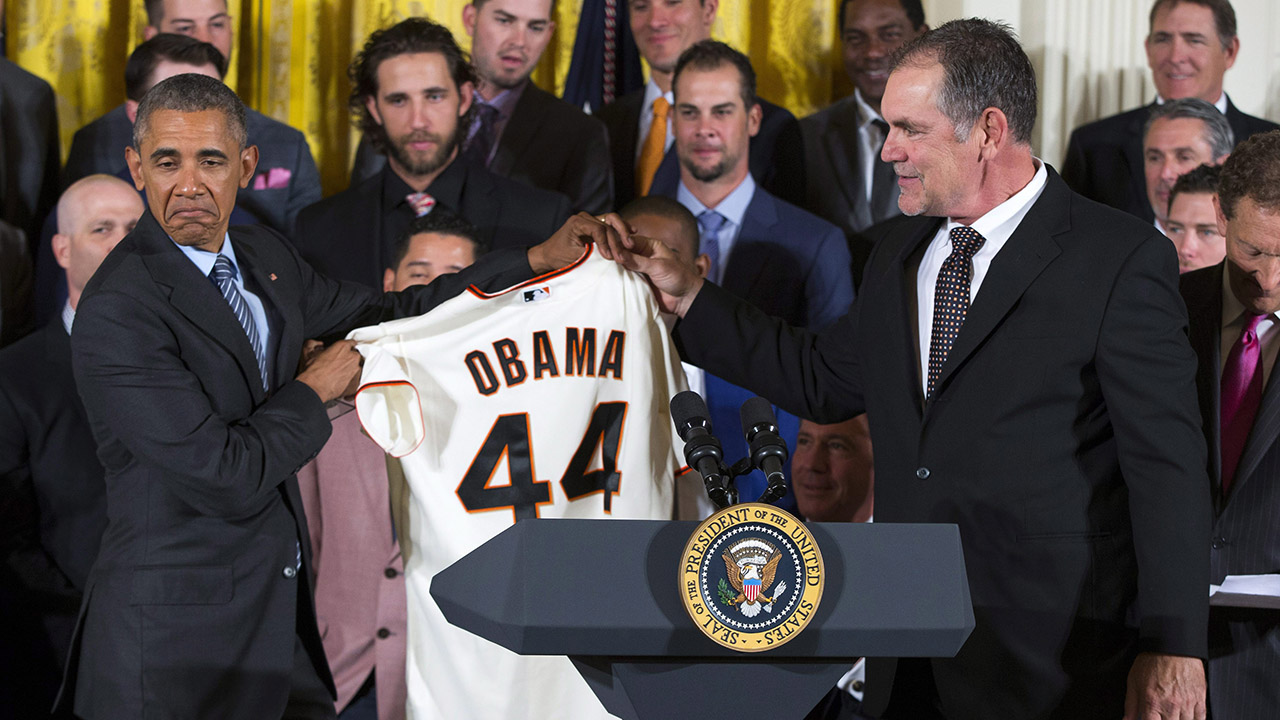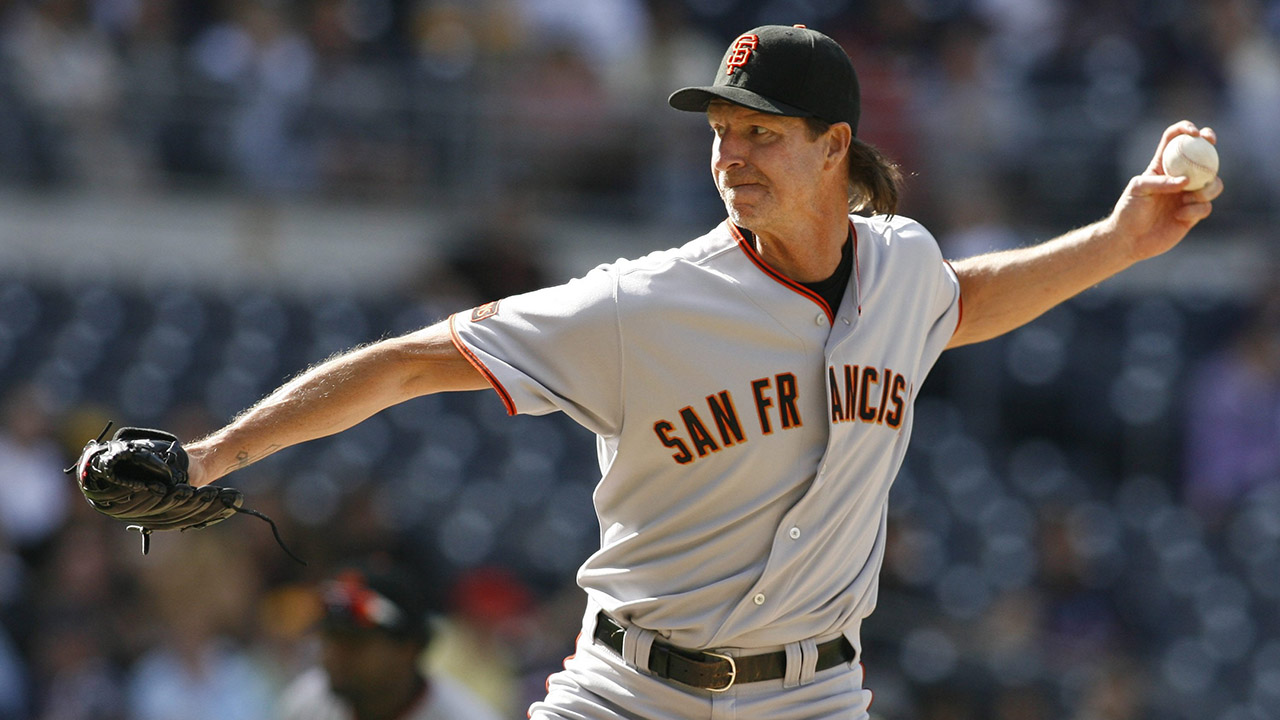Years ago, baseball teams could justify the addition of a big-money player by ringing off a list of intangibles. He’s a leader in the clubhouse. A great character guy. Someone who helps foster a good culture.
In today’s landscape, though, metrics are the driving factor behind transactions and you simply can’t measure the aforementioned qualities by numbers. Take Eric Hosmer for example: The yet-to-be-signed free agent is adored by many inside the sport for his reputation as a leader, however close inspection of his defensive metrics or wins above replacement presents a less-flattering view of the first baseman. [sidebar]
San Francisco Giants manager Bruce Bochy understands the shift toward analytical thinking, but doesn’t believe intangibles should just be tossed to the side. They were, in his eyes, integral to the Giants club that captured three World Series titles in five years.
Bochy, 62, details that connection in the new book Bochy Ball! The Chemistry of Winning and Losing in Baseball, Business and Life. Authored by Kevin and Jackie Freiberg, it offers an inside look at the Giants’ recent championship run and features anecdotes and insight from Bochy. The book — billed as a playbook for baseball people and business people alike — is his second foray into published literature, following 2015’s A Book of Walks.
I chatted with Bochy about the new project, soft factors that contribute to team success and some of the prominent leaders from his past.
What inspired you to participate in the writing of this book?
Kevin Freiberg and I have been friends for over 20 years. In 2010 we won our first World Series. In 2012, we felt like we silenced some of those who said we were lucky. Kevin thought there was a story to be told, but honestly, I just wasn’t quite sure, so we put it on hold. Then after 2014, I was getting a lot of questions from the media, business leaders, people in baseball and just about everyone wanting to know how we did it. Kevin and Jackie approached me again and I said, ‘Yeah.’ This is a great story here. Hopefully it can make a contribution to business leaders, coaches and athletes.
Can you describe your relationship with the Freibergs?
I met Kevin through a friend of mine when I was manager [of the San Diego Padres] back in 1995. He did a lot of speaking on the dynamics of chemistry, building a winning culture. I wanted to get more well-rounded and we’ve been great friends ever since we met. He’s a great sounding board for me, just to get a different, outside-of-baseball perspective. They just help me see things through a different lens.
Kevin and Jackie, they have eight books they’ve written about different leaders in the business world. They’ve worked with iconic leaders all over the world in big companies.

In the analytics age, factors like chemistry, culture and character aren’t given as much weight as in the past. What’s your view on that?
Our game has become so focused on numbers. To a large degree, that’s good. Technology waits for no one. Part of this book, I’m hoping, makes a contribution to the intangible side of the game. Because you need people thinking how important chemistry is. Who knows, maybe it can make a contribution to help us measure that too — it’s something that’s hard to measure, but in all my years, I certainly know it plays a critical role in your team’s success.
There has been some general conversation, especially this off-season, that paying a premium for the leadership quality in players is inefficient.
You have to look at the complete player. But I’d certainly disagree with those who don’t think that that’s an important intangible that comes with a player. You certainly want to acquire the type of players you think are going to fit with your culture. Obviously, I believe chemistry is a huge part of a team’s success. This is what this book is about. I know it says Bochy Ball and has my picture on it, but it’s more about chemistry: What it is and why it matters and how do you bring it about. And that’s how you bring it about — by getting the right characters, along with the talent.
What role do veteran players have in establishing that chemistry?
It’s really important to have leadership inside that clubhouse. Guys who are OK with stepping up, stepping in, and just assuming a leadership role. Sometimes it’s like a parent: You hear something from your parent all the time as a kid, and it goes in one ear, out the other. But when they hear it from their peers, it can mean a little bit more sometimes. That’s why I think it’s important you do have some leaders on a team.
[relatedlinks]
How do you navigate the fine line of leaving veterans to police the roster and stepping in yourself?
You want to be careful that you’re not the one being negative all the time. You want to, of course, stay behind them and be positive but at the same time, there are occasions where players may need some discipline and even a kick in the tail. If it keeps coming from you, you’re going to be looked at as the negative one. That’s why you try to balance it out and hopefully have them hold each other accountable.
There can be different types of leaders. One can be a little more vocal, one can do it by example. You do it by example and that might inspire other guys. What I mean by that is you go out there and you play hard, full throttle, doing all you can to win a game. That can be contagious. But also, a guy who is a little more vocal, a guy who will sit down with a player and just talk to him and do what he can to make his teammate better, that can be a different type of leadership. Both are so important to a club.
Who are some of the standout leaders you’ve managed?
I’ve had some good ones. Ken Caminiti was one of the top ones. He did both: By example, but also could take over a clubhouse with the players, as far as getting them to do things the right way. He wasn’t afraid to challenge somebody.
Kevin Brown. Buster Posey. Juan Uribe. Hunter Pence. I’ll never forget [the 2012 NL Division Series] in Cincinnati; we were down 2-0 to them and needed to win three in a row. I had a little meeting with the players and little did I know, I was just a warmup. After I was done, [Pence] really gave a spiritual, spirited talk to the club. It helped fire them up. He stepped up.

I felt Randy Johnson provided leadership for a young staff in the way he talked to them. For example, he told [Tim] Lincecum after Tim had won one Cy Young award, ‘Are you gonna be content with that?’ Because Randy had won multiple Cy Youngs. It was a great message for a young player: You never arrive in this game. You never stop trying to get better or improve yourself. I just thought he provided great leadership for a young staff in 2009 and helped our guys take the next step and we went on to win the championship the following season.
Speaking of leaders, you guys acquired two face-of-a-franchise players this off-season in Evan Longoria and Andrew McCutchen. What went through your mind after those deals were complete?
First, of all, the great talent we get in both guys. They’re impact players on the field on both sides of the ball … but also the character of these guys. I’ve never had them on my clubs, but in our game, when you get enough calls and texts from guys saying what great teammates these guys are and the leadership they will help provide in that clubhouse, it means a lot. Because these intangibles are really important to us and most clubs, as far as what they provide.
What’s your response to those who criticize the moves by saying that an aging Giants roster got even older?
In our game, everybody’s going to have their opinion. You understand that, but my answer would be that we certainly feel we have a core group here that can win. Sure, we had an off year last year. A lot of businesses, a lot of teams have down years. We’re a year removed from being in the post-season. We were there [in 2016] and battled the Cubs tough, so we weren’t too far away from where we wanted to be.
We weren’t ready to punt and give up and just go younger right now. We wanted to add some players who we felt could help us get back to where we wanted. When you have a core group with Posey and [Madison] Bumgarner, [Brandon] Crawford, [Brandon] Belt and Pence, that’s a pretty good core group and we feel like that window’s still there. An opportunity to get back to the post-season.










